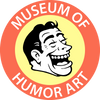Featured In/ As Seen On
Q & A with the Artist..
How long have you been painting and creating art?
All my life..
I started finger painting when I was two.
Seriously-I did always love art but decided to make a career out of my passion
in the early 80's when I really gave it everything I had..all my time and
energy..and it paid off.
I always wanted to be an artist ever since I can remember.
Art, music & science are my passions.
Your artwork is so detailed-there are so many little cool things to discover in them-almost subliminal.. how long does the conceptual stage take for each creation?
I work like a movie studio. I am the casting agent., the head writer, the cinematographer, the editor, and the director.
First I visualize who and what I want to take place in the scene and then where and how it all looks.
I write the titles based upon the characters and the initial concept.
The title brings the entire piece together; creates the "punchline." They all vary but a completed concept can take anywhere from 8
hours to a week, because I may tweak the concept several times before I move forward.
I then usually work nonstop.. once I begin with a new concept, I can't stop
until my vision is complete.
Ultimately, the time it takes to complete the conceptual stage for each creation is a crucial part of the artistic process and plays a significant role in shaping the final outcome of the artwork.
Advertising and the associated images of pop culture is a recurring theme in your humor art. How did you learn so much about classic advertising, etc...
The recurring theme of advertising in many of my pieces of art come from a fascination with the impact of advertising on society, as well as a desire to explore the ways in which popular culture and consumerism intersect.
Classic advertising is often studied and referenced in art as a way to examine the evolution of marketing techniques, messaging, and aesthetics throughout history. I may draw inspiration from vintage ads, logos, slogans, and imagery to create works that comment on consumer culture, nostalgia, branding, and the power of media in shaping our perceptions and behaviors.
By incorporating such elements of classic advertising into my art, I can playfully critique or have fun with commercial messages, challenge the conventions of marketing, and highlight the absurdity or irony of consumerist society.
I use the various imagery in a whole different light, juxtaposing characters in a setting that often has nothing to do with the brand itself.
I love to create humorous "What if" situations...
Many of your Museum of Humor Art pieces have controversial religious, political or social and historical references? Where does that stem from?
The inclusion of such references in my art pieces in stems from a desire to provoke thought, spark conversation, challenge societal norms, and basically, provide commentary on current or historical events and issues.
Humor can be a powerful tool for addressing serious topics in a lighthearted or satirical manner, allowing artists to delve into sensitive subjects while still engaging and entertaining audiences.
Incorporating such references can also add layers of complexity and depth to the artworks, inviting viewers to consider multiple perspectives and interpretations. Ultimately, the use of controversial themes in art can serve as a means of reflection, critique, and dialogue on the world around us.
I believe that good art makes you think.
It should provoke you into thought or emotion one way or another, whether it makes you laugh out loud or pisses you off. If I am not doing that, then I am not doing my job as an artist.
In your mind, is there such a thing as bad art, or is all art relevant?
There really is no such thing as "good" or "bad." It's all relative to the viewer's perception.
I guess, as I stated earlier, I do believe that to qualify as "good,"
it has to move the viewer in some way emotionally, even if it's in a negative manner.
What are other mediums of art you'd like to attempt?
I would love to try my hand some day at film or television, maybe even a documentary.
As a very successful artist and entrepreneur, what advice would you give to the reader or any aspiring artists?
As a successful artist and individual, I would offer the following advice to the reader:
- Stay true to yourself: Authenticity is key in any endeavor, especially a creative one. Stay true to your unique voice, vision, and style, and don't be afraid to express your individuality through your art.
- Embrace failure and learn from it:
Failure is a natural part of the creative process. Embrace setbacks as opportunities for growth, learning, and improvement. Use failures as stepping stones towards success. - Work hard and stay
disciplined:
Success in the art world, as in any field, requires dedication, hard work, and a lot of discipline. Set goals, create a routine, and stay focused on your craft to achieve your artistic aspirations.
Stay resilient and persevere; The road to success in the art world can be challenging and full of obstacles. You need to be able to weather the tough times and never give up on your artistic dreams if it's what you really want and believe in.
Remember, success is a journey, not a destination. Keep creating, exploring, and pushing boundaries in your art, and trust in your passion and dedication to lead you towards your artistic goals.
Don't chase the money-chase the dream; the money will come if you do what you love.

- Choosing a selection results in a full page refresh.
!








